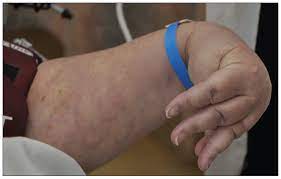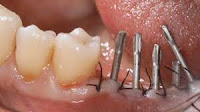Which of the following is not used to treat psychosis.. Aluoxetine
Which of the following is not used to treat psychosis?
a- Aluoxetine***
b- Haloperidol
c- Perphenazine
d- Resperidone.
----------------------------
Treatments of psychosis:
The first phase of treatment consists of an exhaustive evaluation through a visit by the psychiatrist.
During this interview, time is spent getting to know the affected person and, if possible, also the family or people close to her.
In general, blood tests and neuroimaging tests (magnetic resonance imaging) are performed to rule out possible organic causes of psychotic symptoms.
It can be a period of confusion and anguish for the patient, so it is very important the support and understanding received by all medical and care staff.
This relationship of mutual trust between the patient and the mental health team is essential to occur from the beginning of the therapeutic process.
The information collected during the interview and the tests performed will clarify the specific nature of psychosis and the most appropriate treatment in each case.
In some cases, the symptoms will disappear shortly after starting treatment, allowing the patient to resume his normal life in a short period of time.
In others, recovery may take weeks or even months.
As in other diseases, it may be appropriate to temporarily suspend work activity or studies to restart them later, once recovered, and thus have more guarantees of success.
The type of treatment may vary depending on the patient's preferences, the severity of the symptoms, the time they have been present and their possible causes.
Medicines:
Medications are an essential part of the treatment of psychotic disorders and, together with other forms of therapy, have a fundamental role in recovery after the psychotic episode and in the prevention of subsequent episodes.
There are different types of highly effective drugs, both in the reduction of psychotic symptoms and in the relief of the anxiety that accompanies them.
The treatment is usually started at low doses and it is the psychiatrist who determines, together with the patient, the necessary modifications, according to the evolution of the symptoms.
A large number of drugs are available, which allows changes to be made between them in case of side effects.
It is important that the patient inform his psychiatrist if he has any adverse effect, since its appearance can worsen the fulfillment of a treatment, which as we have already said, is essential for recovery.
Orientation and psychotherapy:
Having a team of professionals to talk to is an important part of the treatment.
There are different types of therapy and the choice will depend on the needs of the patient and the phase of the psychosis in which they are.
Initially, it may be enough to have someone who understands the situation and conveys confidence in the recovery.
As the recovery process progresses, doubts or concerns about the disease may arise and it may be convenient to know measures to avoid relapses, such as techniques to manage stress or learn to recognize alarm signals early.
Orientation or psychotherapy can be done individually or in groups.
Practical help:
It can also be part of the treatment, in some cases, practical help to cope with day-to-day difficulties.
In all mental health centers there are social workers who can help solve problems related to returning to work or studies, the use of free time, housing, etc.
a- Aluoxetine***
b- Haloperidol
c- Perphenazine
d- Resperidone.
----------------------------
Treatments of psychosis:
The first phase of treatment consists of an exhaustive evaluation through a visit by the psychiatrist.
During this interview, time is spent getting to know the affected person and, if possible, also the family or people close to her.
In general, blood tests and neuroimaging tests (magnetic resonance imaging) are performed to rule out possible organic causes of psychotic symptoms.
It can be a period of confusion and anguish for the patient, so it is very important the support and understanding received by all medical and care staff.
This relationship of mutual trust between the patient and the mental health team is essential to occur from the beginning of the therapeutic process.
The information collected during the interview and the tests performed will clarify the specific nature of psychosis and the most appropriate treatment in each case.
In some cases, the symptoms will disappear shortly after starting treatment, allowing the patient to resume his normal life in a short period of time.
In others, recovery may take weeks or even months.
As in other diseases, it may be appropriate to temporarily suspend work activity or studies to restart them later, once recovered, and thus have more guarantees of success.
The type of treatment may vary depending on the patient's preferences, the severity of the symptoms, the time they have been present and their possible causes.
Medicines:
Medications are an essential part of the treatment of psychotic disorders and, together with other forms of therapy, have a fundamental role in recovery after the psychotic episode and in the prevention of subsequent episodes.
There are different types of highly effective drugs, both in the reduction of psychotic symptoms and in the relief of the anxiety that accompanies them.
The treatment is usually started at low doses and it is the psychiatrist who determines, together with the patient, the necessary modifications, according to the evolution of the symptoms.
A large number of drugs are available, which allows changes to be made between them in case of side effects.
It is important that the patient inform his psychiatrist if he has any adverse effect, since its appearance can worsen the fulfillment of a treatment, which as we have already said, is essential for recovery.
Orientation and psychotherapy:
Having a team of professionals to talk to is an important part of the treatment.
There are different types of therapy and the choice will depend on the needs of the patient and the phase of the psychosis in which they are.
Initially, it may be enough to have someone who understands the situation and conveys confidence in the recovery.
As the recovery process progresses, doubts or concerns about the disease may arise and it may be convenient to know measures to avoid relapses, such as techniques to manage stress or learn to recognize alarm signals early.
Orientation or psychotherapy can be done individually or in groups.
Practical help:
It can also be part of the treatment, in some cases, practical help to cope with day-to-day difficulties.
In all mental health centers there are social workers who can help solve problems related to returning to work or studies, the use of free time, housing, etc.







%20tube%20has%20stopped%20draining..%20Notify%20the%20physician.jpg)